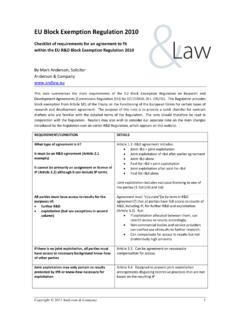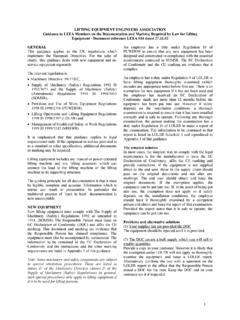Transcription of THE EUROPEAN COMMISSION (2002) - OECD.org
1 COMPETITION LAW AND POLICY IN THE EUROPEAN COMMISSION 1 THE EUROPEAN COMMISSION (2002) Executive Summary1 In 2002, the COMMISSION pressed ahead with its work on modernising the Community rules in all areas of competition policy. In antitrust, its proposal for recasting Regulation No 17 implementing Articles 81 and 82 of the EC Treaty was adopted by the Council on 16 December, clearing the way for decentralised application of the Community rules in this field by national competition authorities acting in close cooperation with the COMMISSION , as well as direct application by national courts. In addition, a new block exemption regulation in the motor vehicle sector will boost competition considerably in this vital area of the economy, at the level of both sales and after-sales service, and will benefit consumers in terms of prices and opportunities for cross-border purchases. The COMMISSION also continued to give high priority to detecting, prosecuting and punishing unlawful agreements, which were the subject of numerous decisions imposing fines.
2 On the mergers front, the observations made by interested parties in response to the COMMISSION 's Green Paper on the review of the merger regulation enabled it to draw conclusions on a whole series of concepts and approaches designed to improve the existing legislation. On 11 December, it adopted a proposal for amending the merger regulation. In the State-aid field, the Barcelona EUROPEAN Council endorsed the Council's appeals for continued efforts to reduce the overall level of aid and redirect resources towards objectives of common interest and to modernise the Community competition rules. For its part, the COMMISSION launched a reform designed to simplify procedures for cases which do not raise major legal concerns so as to free up resources to handle the more important cases, as well as the cases which will arise after enlargement of the EU, in a context of greater transparency and predictability. On 29 April, it adopted the XXXIst Report on Competition Policy2, which takes stock of its activity in the field in 2001 and which was the subject of a resolution adopted by the EUROPEAN Parliament on 21 November 3.
3 I. Changes to competition laws and policies, proposed or adopted General rules 4 1. Consequences of expiry of the ECSC Treaty. Following the expiry of the Treaty establishing the EUROPEAN Coal and Steel Community on 23 July, the sectors previously covered by that Treaty and the procedural rules and secondary legislation derived from it became subject to the EC Treaty, and on 21 June 1 This report to the OECD mostly follows the competition section of the 2002 EUROPEAN COMMISSION General Report. 2 SEC(2002) 462; Bull. 4-2002, point ; Internet 3 Bull. 11-2002, point 4 Detailed statistics on the application of Articles 81 and 82 of the EC Treaty are provided in the Report on Competition Policy published in 2003 COMPETITION LAW AND POLICY IN THE EUROPEAN COMMISSION 2 the COMMISSION issued a communication 5 dealing with certain aspects of the treatment of competition cases resulting from the changeover.
4 2. Fines in cartel cases. Under a notice 6 adopted on 13 February, based on experience gained since 1996 7 and aimed at strengthening the capacity to detect and prosecute cartel cases while improving legal certainty, the COMMISSION can grant 'conditional immunity from fines' to the first firm contributing decisively to the identification or banning of a cartel. 3. New regulation implementing Articles 81 and 82 of the EC Treaty. On 16 December, following a political agreement reached at the end of November, the Council adopted Regulation (EC) No 1/2003 on the implementation of Articles 81 and 82 of the EC Treaty, which marks the most fundamental overhaul of the antitrust rules since Regulation No 17. One of the key aspects of the reform is the elimination of the practice of notifying agreements to the COMMISSION . This will make procedures less cumbersome and will reduce legal costs for companies. The adoption of the new regulation before the large-scale enlargement of the EUROPEAN Union will also tighten application of the antitrust rules, including by the national courts, and will allow tasks to be shared more effectively between the COMMISSION and the national authorities.
5 The regulation will moreover allow the COMMISSION and the national authorities to concentrate their resources on the task of combating price-fixing agreements and other types of agreement that really harm the market. Permissible forms of cooperation Sectoral approach 4. Motor vehicle distribution. On 31 July, the COMMISSION adopted a regulation 8 amending, from October onwards, the previous arrangements 9 in order to put right the competition problems identified in its November 2000 evaluation report 10. The goal of the new regulation is to boost competition and bring tangible benefits to EUROPEAN consumers as regards vehicle sales and after-sales servicing thanks, in particular, to multi-brand dealerships and easier cross-border purchases of new vehicles. There is a one-year transition period to allow adaptation of existing contracts. At Parliament's request 11, a longer transition period until the end of September 2005 has been specifically allowed for the removal of location clauses.
6 On 30 September, the COMMISSION published an explanatory brochure on the new competition rules on motor car sales and servicing 12 designed to provide the general public with information on the new rights and obligations of vehicle manufacturers, dealers and repairers and the rights of consumers under the new rules. 5. Insurance. Since Regulation (EEC) No 3932/92 exempting certain categories of agreements in the insurance sector 13 is due to expire on 31 March 2003, the COMMISSION published a new draft 5 OJ C 152, ; Bull. 6-2002, point 6 OJ C 45, ; SEC(2002) 150; Bull. 1/2-2002, point 7 OJ C 207, ; 1996 General Report, point 156. 8 Regulation (EC) No 1400/2002 (OJ L 203, ; Bull. 7/8-2002, point ). 9 Regulation (EC) No 1475/95 (OJ L 145, ; 1995 General Report, point 142). 10 2000 General Report, point 193. 11 Bull. 5-2002, point 12 #020930.
7 13 OJ L 398, ; Twenty-sixth General Report, point 198. COMPETITION LAW AND POLICY IN THE EUROPEAN COMMISSION 3 regulation 14 on 9 July on which it invited interested parties to give their opinion. The draft innovates with regard to indicative risk premiums, standard insurance policy conditions, common coverage of certain categories of risk (pools) and security equipment. 6. IATA (International Air Transport Association) passenger tariff conferences. On 25 June, following a wide-ranging consultation of interested parties, the COMMISSION adopted a regulation renewing the block exemption for the IATA passenger tariff conferences until 30 June 2005 15. II. Enforcement of competition laws and policies16 Individual cases 7. FIFA. By decision of 15 April, the COMMISSION formally rejected a complaint against the rules governing the activities of players' agents laid down by the International Football Federation (FIFA), thereby recognising that FIFA was entitled to regulate the profession with a view to upholding ethical standards provided that access remained open and non-discriminatory.
8 By decision of 30 May, it also rejected two complaints against the rules governing international transfers of football players laid down by FIFA, which had to do mainly with unilateral breaches of contract by players 17. 8. UEFA. On 25 June, the COMMISSION formally rejected the complaint lodged in 2000 by ENIC against UEFA, the governing body of EUROPEAN football, concerning the rule whereby two or more clubs participating in a UEFA club competition may not be directly or indirectly controlled by the same entity or managed by the same person 18. The COMMISSION concluded that, although the UEFA rule was a decision taken by an association of undertakings, it could be exempted from the ban in principle set out in Article 81(1) of the EC Treaty provided that it did not exceed what was necessary in order to achieve the legitimate objective of guaranteeing the integrity of competitions and that it was applied in a non-discriminatory manner.
9 9. Austrian Airlines/Lufthansa. On 5 July, the COMMISSION exempted a cooperation agreement between Austrian Airlines and Lufthansa 19 up to 31 December 2005, six years from the date of notification. The exemption was granted only after the parties had accepted major changes to the agreement: they are required among other things to allocate up to 40 % of the slots available to any new entrants and to apply the same fare reductions they offer on a route on which they face competition to three other routes between Austria and Germany on which there is no competition. The COMMISSION established, on the basis of the obligations imposed, that several competitors were interested in entering the market. Visa. On 24 July, the COMMISSION granted conditional exemption for certain multilateral interchange fees 14 OJ C 163, ; Bull. 5-2002, point 15 Regulation (EC) No 1105/2002 (OJ L 167, ).
10 16 Only the most significant cases are dealt with in this section. For further information, as well as for detailed statistics on the cases handled by the COMMISSION and on the relevant case-law, see the XXXIInd Report on Competition Policy. In conjunction with the XXXIInd Report (Part I), a report on the application of the competition rules in the EUROPEAN Union in 2002 (Part II), prepared under the sole responsibility of the Directorate-General for Competition, is also available. Both reports can be obtained from the Office for Official Publications of the EUROPEAN Communities or accessed on the Europa server ( ). 17 Bull. 5-2002, point 18 Bull. 6-2002, point 19 Bull. 7/8-2002, point COMPETITION LAW AND POLICY IN THE EUROPEAN COMMISSION 4 (MIF) for cross-border payments by Visa card 20. The exemption, valid until 31 December 2007, was granted only after major changes to the Visa system.















